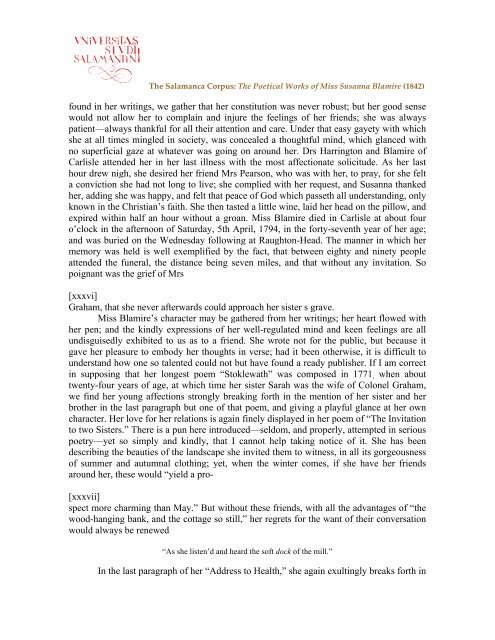The Poetical Works of Miss Susanna Blamire (1842) - Gredos ...
The Poetical Works of Miss Susanna Blamire (1842) - Gredos ...
The Poetical Works of Miss Susanna Blamire (1842) - Gredos ...
You also want an ePaper? Increase the reach of your titles
YUMPU automatically turns print PDFs into web optimized ePapers that Google loves.
<strong>The</strong> Salamanca Corpus: <strong>The</strong> <strong>Poetical</strong> <strong>Works</strong> <strong>of</strong> <strong>Miss</strong> <strong>Susanna</strong> <strong>Blamire</strong> (<strong>1842</strong>)<br />
found in her writings, we gather that her constitution was never robust; but her good sense<br />
would not allow her to complain and injure the feelings <strong>of</strong> her friends; she was always<br />
patient—always thankful for all their attention and care. Under that easy gayety with which<br />
she at all times mingled in society, was concealed a thoughtful mind, which glanced with<br />
no superficial gaze at whatever was going on around her. Drs Harrington and <strong>Blamire</strong> <strong>of</strong><br />
Carlisle attended her in her last illness with the most affectionate solicitude. As her last<br />
hour drew nigh, she desired her friend Mrs Pearson, who was with her, to pray, for she felt<br />
a conviction she had not long to live; she complied with her request, and <strong>Susanna</strong> thanked<br />
her, adding she was happy, and felt that peace <strong>of</strong> God which passeth all understanding, only<br />
known in the Christian’s faith. She then tasted a little wine, laid her head on the pillow, and<br />
expired within half an hour without a groan. <strong>Miss</strong> <strong>Blamire</strong> died in Carlisle at about four<br />
o’clock in the afternoon <strong>of</strong> Saturday, 5th April, 1794, in the forty-seventh year <strong>of</strong> her age;<br />
and was buried on the Wednesday following at Raughton-Head. <strong>The</strong> manner in which her<br />
memory was held is well exemplified by the fact, that between eighty and ninety people<br />
attended the funeral, the distance being seven miles, and that without any invitation. So<br />
poignant was the grief <strong>of</strong> Mrs<br />
[xxxvi]<br />
Graham, that she never afterwards could approach her sister s grave.<br />
<strong>Miss</strong> <strong>Blamire</strong>’s character may be gathered from her writings; her heart flowed with<br />
her pen; and the kindly expressions <strong>of</strong> her well-regulated mind and keen feelings are all<br />
undisguisedly exhibited to us as to a friend. She wrote not for the public, but because it<br />
gave her pleasure to embody her thoughts in verse; had it been otherwise, it is difficult to<br />
understand how one so talented could not but have found a ready publisher. If I am correct<br />
in supposing that her longest poem “Stoklewath” was composed in 1771 , when about<br />
twenty-four years <strong>of</strong> age, at which time her sister Sarah was the wife <strong>of</strong> Colonel Graham,<br />
we find her young affections strongly breaking forth in the mention <strong>of</strong> her sister and her<br />
brother in the last paragraph but one <strong>of</strong> that poem, and giving a playful glance at her own<br />
character. Her love for her relations is again finely displayed in her poem <strong>of</strong> “<strong>The</strong> Invitation<br />
to two Sisters.” <strong>The</strong>re is a pun here introduced—seldom, and properly, attempted in serious<br />
poetry—yet so simply and kindly, that I cannot help taking notice <strong>of</strong> it. She has been<br />
describing the beauties <strong>of</strong> the landscape she invited them to witness, in all its gorgeousness<br />
<strong>of</strong> summer and autumnal clothing; yet, when the winter comes, if she have her friends<br />
around her, these would “yield a pro-<br />
[xxxvii]<br />
spect more charming than May.” But without these friends, with all the advantages <strong>of</strong> “the<br />
wood-hanging bank, and the cottage so still,” her regrets for the want <strong>of</strong> their conversation<br />
would always be renewed<br />
“As she listen’d and heard the s<strong>of</strong>t dock <strong>of</strong> the mill.”<br />
In the last paragraph <strong>of</strong> her “Address to Health,” she again exultingly breaks forth in
















